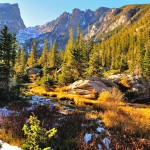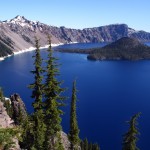Overview of Environmental Studies
Environmental Science is a multidisciplinary field of study that integrates the traditional sciences, such as biology, chemistry, ecology, and physics with the social sciences, such as business, sociology and economics. Degree programs are designed to build a strong foundation in the traditional and social sciences while exposing students to a variety of environmentally-focused specializations such as conservation, alternative energy, sustainable agriculture, and urban planning, to name a few. Environmental scientists apply their diverse academic background to the study of environmental systems, and seek to find solutions to environmental problems such as: pollution control, alternative energy systems, global climate change and natural resource management.
Career Options with a Degree in Environmental Science
Earning a degree in Environmental Science leads to a growing list of exciting career paths and fields. As public awareness about environmental issues and the movement towards eco-responsibility grows, employers in the private sector have begun to create positions that deal with the preservation and growth of sustainable environments. Employment opportunities can be also found in the public sector, including local and state conservation and law enforcement agencies, and federal agencies such as the National Park Service, Department of Natural Resources, National Forest Service, and U.S. Fish and Wildlife Services. Listed below are a few of the many popular career titles sought by graduates of environmental science programs:
- Environmental Scientist
- Ecologist
- Game Warden
- Urban and Regional Planner
- Agricultural Agent
- Botanist
- Conservation Officer
- Wildlife Biologist
- Environmental Analyst
- Environmental Consultant
- Biomedical Engineer
- Resource Economist
- Natural Resource Manager
- Park Ranger
- Post Secondary Teacher
- Environmental Lobbyist
- Wildlife Manager
- Conservationist
- Hydrologist
- Environmental Planner
- Air and Water Quality Manager
- EPA Inspector
- Zoologist
- Hazardous Waste Manager
Summary of Environmental Sciences Degrees
Students interested in one of the many exciting careers available in the fields of conservation, environmental science and technology, healthcare, and wildlife preservation are encouraged to pursue an environmental science degree. A degree in environmental science is designed to build a strong foundation in the traditional and social sciences which are required to qualify for positions in these fields. The following section examines the objectives and curriculum requirements for associate, bachelors and master’s degree programs.
Associates Degree in Environmental Science
An associate degree in environmental science is a two-year program designed to introduce students to post-secondary levels of math, science, humanities, and English composition (often called general studies or a liberal arts education) while also providing students with a basic introduction to concepts specific to environmental science. Students who pursue an associate degree often enter the program with the intention of earning the credit hours required to transfer into to a four-year baccalaureate program, or who plan on seeking employment at an entry level. By completing an associate degree program, graduates should be able to:
- Demonstrate fundamental knowledge biology, geology and chemistry concepts.
- Understand basic research and data analysis methodologies.
- Collect and assess data and prepare lab reports.
- Demonstrate proficiency in the use of lab and field instruments for collecting and analyzing data.
- Articulate basic environmental regulatory and compliance standards.
Coursework
The coursework in an associate level environmental science program combines basic science classes in biology, geology and chemistry with general education requirements in English, math and communications. Some programs offer specializations in areas such as water resource management, environmental conservation, ecology, energy management or sustainability. The table below includes examples of courses that may be offered by an associate level program:
| Course | Course Description |
|---|---|
Geology | Integrated study of the principles of physical geology with emphasis on analysis of processes at work upon and within the earth. |
General Chemistry | Fundamental principles of chemistry including topics such as atomic and molecular structure and nuclear chemistry. |
Pre-Calculus | Explores functions and geometry including properties and graphs of polynomial, rational, exponential, logarithmic, trigonometric and inverse trigonometric functions. |
Introduction to Environmental Science | Examines the risks and environmental impact of human behavior and population growth on natural resources. |
Physics | Study of the properties of energy and matter, the structure of atoms, and the nature of heat, electricity, sound, magnetism, and radiation. |
Bachelor of Science in Environmental Science
Environmental science programs at the baccalaureate level are designed to solidify a student's foundation of knowledge in the traditional and social sciences while expanding a students understanding of more advanced concepts specific to the field of environmental science. Both introductory and advanced level training are offered in areas such as: monitoring environmental conditions, analyzing environmental problems, environmental management, wildlife preservation, conservation, and environmental policy and regulation.
Coursework
A bachelor's degree curriculum typically combines interdisciplinary study in the hard sciences with advanced level coursework in environmental analysis, theory and policy. Students are expected to develop strong oral and written communication skills as well as learn advanced research and analysis methodologies used to solve complex environmental problems. The following table is provided as an example of the courses that may be offered by bachelor level environmental science programs:
| Course | Course Description |
|---|---|
Environmental Botany | Deals with botanic natural history and related environmental issues, including diversity of biomes and habitats and taxonomy/identification of major plant groups. |
Zoology | Introduction to the classification, relationships, structure and function of major animal phyla. |
Geology | Overview of a broad range of topics related to geologic processes and society including natural hazards and natural resources. |
Environmental Statistics | Introduction to probability and statistics with emphasis on applications in forestry and environmental sciences, including methods of graphical analysis, common probability distributions and hypothesis testing. |
Environmental Law | Exploration of field of environmental law designed to help hone the thinking and analytical skills that govern this area. |
Global Climate Change | Physical science perspectives on global environmental change, discussing causes, mechanisms and impacts of major types on ecosystem structure and functions. |
Master's Degree in Environmental Science
Graduate level programs in environmental science provide students with the broad multi-disciplinary subject matter, methodologies and insights necessary to be successful in leadership positions with the fields of consulting, environmental protection, environmental policy, industrial and environmental management and scientific research. Students are expected to participate in seminar presentations and fieldwork throughout the program,which hones their understanding of the bio-complexity of the Earth's ecosystems and the processes that keep them in balance. Programs typically culminate with a thesis or comprehensive examination. Graduates of masters level environmental science programs are expected to meet program objectives that include:
- Understanding of environmental systems and the relationship between science, environmental management and the human condition.
- Ability to think critically and use analytical techniques to solve complex environmental problems at the local, state, regional, national and international level
- Demonstrate an advanced understanding of integrated systems used to grow sustainable practices in the community, state and world.
Coursework
Students at the master's level are presented with rigorous coursework, with a focus on lab and field techniques that meet the standard of government agencies, consulting firms and other professions within the environmental, biomedical and science industries. The table below is an example of some of the courses taken by students enrolled in an environmental science master’s degree program:
| Course | Course Description |
|---|---|
Environmental Issues | Advanced study of the major contributions of the social sciences to understanding how and why environmental problems happen. |
Energy and the Environment | Provides a broad understanding of the current energy system and its challenges, particularly with respect to the environment, and possible paths to a sustainable energy future. |
Soil Science | An overview of concepts in soil science including Genesis, Classification and Morphology Physics, Chemistry, Fertility, Biology and Land Use. |
Environmental Systems I | Advanced study of the atmospheric environment of the Earth including the elements and controls of climate and their implications for hydrology, vegetation and soils. |
Environmental Systems II | Examines the design and analysis of the building envelope, with a focus on the material and energetic transformations taking place at the boundary between architecture and environment. |
Natural Resource Photogrammetry and Geographic Information Systems | Introduction to geographic information technologies for natural resources application including GIS, Remote Sensing, GPS and Cartography. |









